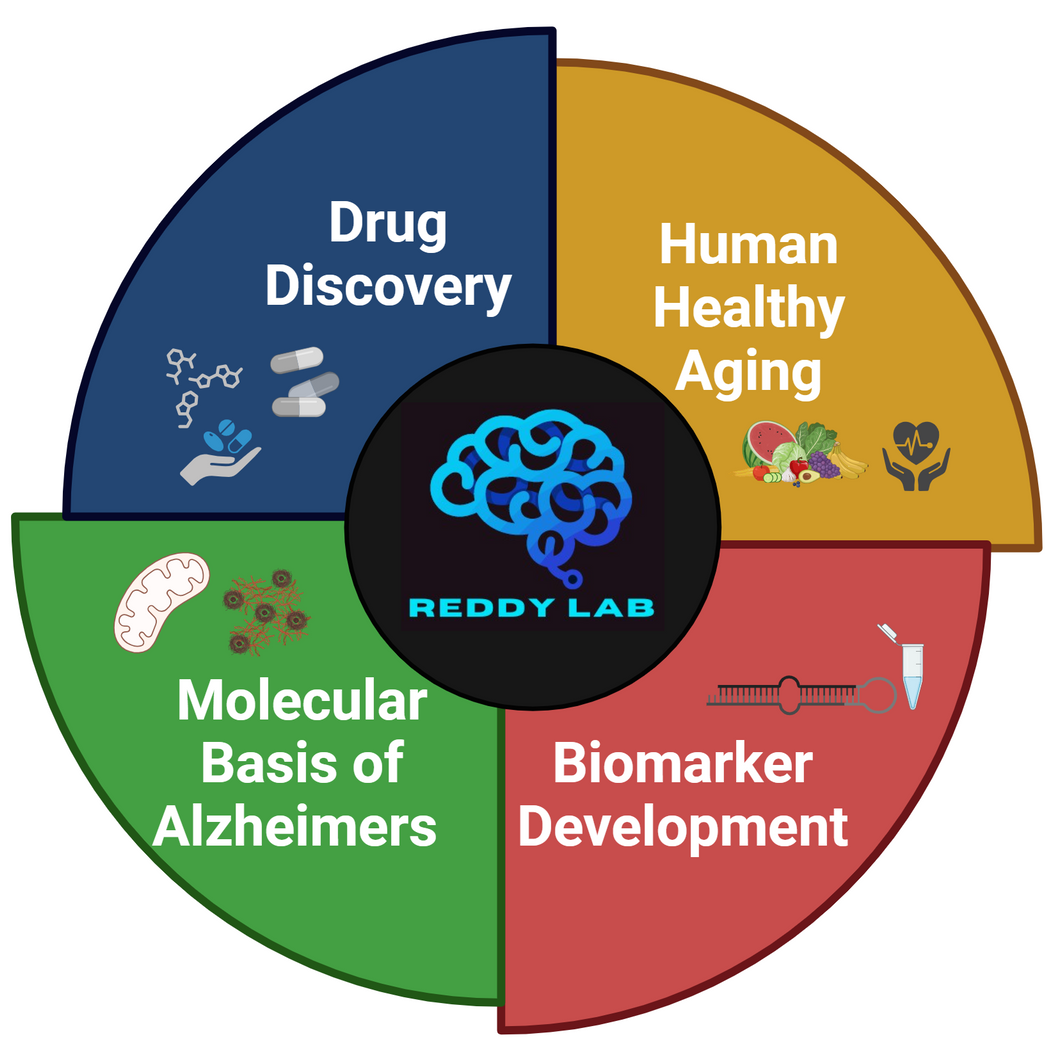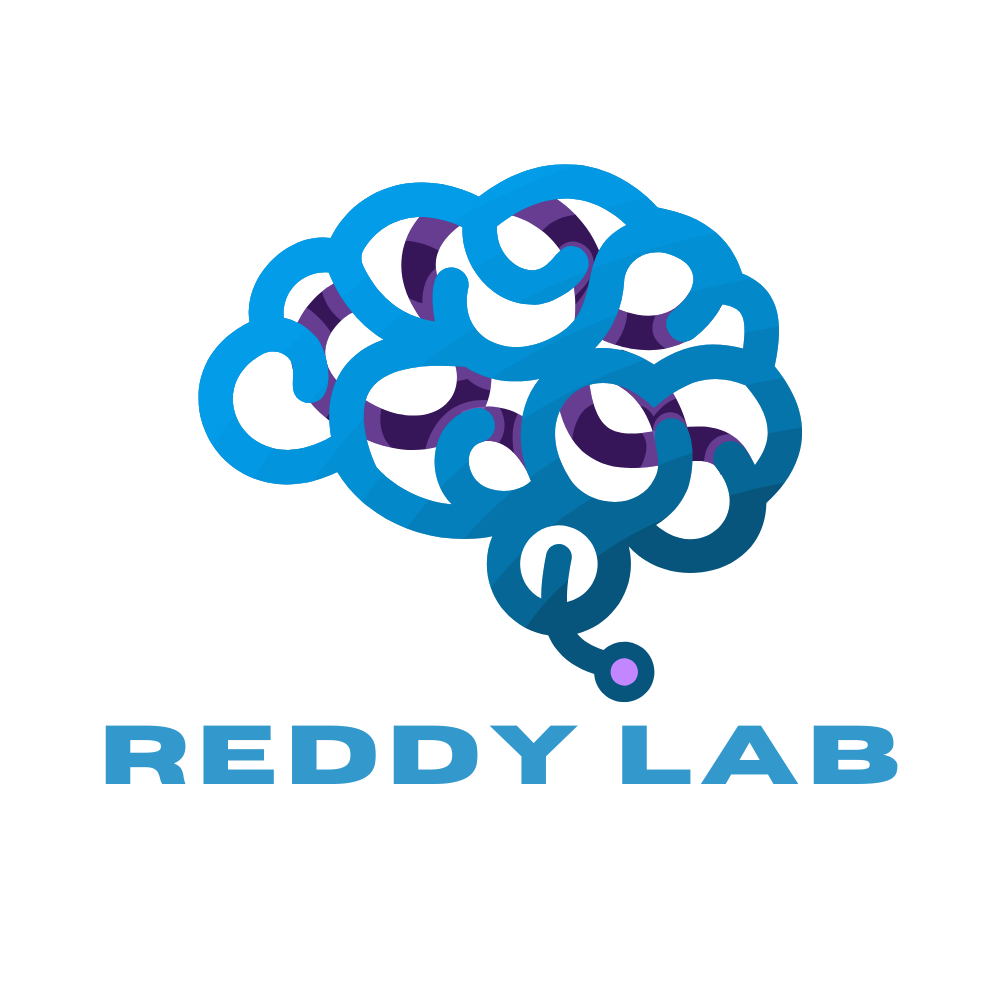Research
At the Reddy Lab, we are dedicated to pioneering research that transforms our understanding of aging and neurodegenerative diseases. Led by Dr. P. Hemachandra Reddy, our multidisciplinary team combines cutting-edge scientific inquiry with innovative approaches to uncover the molecular mechanisms driving these complex conditions. Through our commitment to groundbreaking research, we aim to develop effective diagnostic tools and therapies that enhance the quality of life for individuals affected by neurodegenerative diseases and their families. At the Reddy Lab, we are committed to supporting all ethnic groups and spreading awareness about dementia, fostering a more inclusive understanding of these diseases. We warmly welcome students of all levels—undergraduate, graduate, medical, and even high school—to join us as volunteers, where they can learn valuable scientific techniques and enhance their skills in scientific writing while contributing to meaningful research. Join us on this vital journey towards discovery and hope.

Drug Discovery
Drug discovery is the major focus of our laboratory, (curcumin), anti aging agents (resveratrol), mitochondria-targeted molecules, DDQ, MitoQ, SS31, and mitochondrial division inhibitor 1 (Mdivi-1) against mutant proteins Abeta, phosphorylated Tau and mutant huntingtin. DDQ molecules are designed, synthesized, and tested in our laboratory and extensively published in cell and mouse models of aging, Amyloid beta, phosphorylated tau, and for Investigational Drug (IND).
Our research investigates the neuroprotective effects of DDQ, a novel compound developed in the Reddy lab, against AD pathology. We assessed DDQ in various preclinical models, including hAbKI and APP transgenic mice, tau transgenic mice, and HT22 neuronal cells. Our findings revealed that DDQ significantly improves cognitive function, mitochondrial health, and reduces neurodegenerative markers. Specifically, DDQ enhances cognitive performance in hAbKI mice and mitigates amyloid-beta toxicity in APP transgenic mice while restoring mitochondrial biogenesis and dynamics. In tau transgenic models, DDQ reduces tau-induced mitochondrial toxicity and neuroinflammation, promoting cellular resilience and upregulation of mitophagy markers. Additionally, DDQ enhances synaptic protein expression and anti-aging proteins in neuronal cells. With its multifaceted mechanism addressing mitochondrial dysfunction and neurodegeneration, DDQ shows promise as a therapeutic candidate for AD, warranting further exploration of its long-term effects and mechanisms in ongoing studies.
Biomarker Development
Currently, Reddy laboratory is involved in developing circulating microRNAs as peripheral biomarkers using peripheral biofluids such as serum, urine, and saliva from young, middle-aged individuals and individuals with mild cognitive impairment and AD patients and patients with Ischemic stroke and type 2 Diabetes.
We have extensive experience in growing primary hippocampal, cortical, striatal neurons, progenitor striatal neurons, human & mouse neuroblastoma cells, and mixed cultures of neurons & glia, embryonic stem cells, and extensively studied the beneficial effects of natural products.
Molecular Basis of Alzheimer's Disease
Abnormal mitochondrial dynamics and mitochondrial therapeutics are major areas of research in our laboratory. We extensively studied RNA silencing of AD and HD genes, and axonal transport of mitochondria, mitochondrial dynamics, and synaptic degeneration in HD, AD neurons using primary neurons and state-of-the-art live-cell imaging methods.
The major strengths of our laboratory include the development and characterization of mouse models for aging and neurodegenerative diseases, particularly Alzheimer’s, Huntington’s disease, Parkinson’s disease, and multiple sclerosis. Recently, we created microRNA-455-3p transgenic and knockout mouse models, along with models for the oxidative stress protein RLIP. Our research centers on RLIP76 (Rlip), a critical stress-responsive protein involved in aging and Alzheimer’s disease. Rlip plays a significant role in regulating oxidative stress, mitochondrial function, and neuronal health, and interacts with Alzheimer's-associated proteins such as amyloid beta and phosphorylated tau, contributing to oxidative stress and synaptic dysfunction. Through in vitro and in vivo studies, we found that Rlip overexpression enhances mitochondrial function, while its partial reduction leads to cognitive deficits akin to late-onset Alzheimer’s. Our lab is also conducting crossbreeding experiments with transgenic Alzheimer’s models (5XFAD, APPKI, and Tau mice) to investigate how Rlip influences disease progression through mitochondrial dynamics, oxidative stress pathways, and neuroinflammation. This research offers novel insights into the cellular mechanisms underlying Alzheimer’s disease, positioning Rlip as a potential biomarker and therapeutic target for neurodegeneration. Through our ongoing efforts, we strive to develop innovative strategies to mitigate Alzheimer’s pathology and enhance cognitive function in affected individuals.
Human Healthy Aging Studies
The Reddy Lab focuses extensively on understanding the biological, psychological, and social mechanisms underlying healthy aging, with a particular emphasis on neurodegenerative conditions such as Alzheimer's disease (AD) and mild cognitive impairment (MCI). This research holds special significance for rural West Texas, a region often overlooked in scientific research, which tends to focus on larger urban centers. Populations in rural West Texas, especially minorities such as Hispanics and other underserved groups, remain underrepresented in studies related to aging and cognitive health. The Reddy Lab is dedicated to addressing this gap by focusing on these neglected sections of society and ensuring equitable representation in research efforts. Their work spans three major areas: healthy aging research, caregiver support, and the effects of sleep deprivation on aging and cognitive health.
The Reddy Lab's research focuses on the biological factors contributing to healthy aging, particularly cognitive resilience in elderly populations. We study the unique characteristics of centenarians to identify genetics, lifestyle choices, and brain structure differences promoting prolonged cognitive health. Our work emphasizes four key lifestyle parameters: diet, exercise, stress management, and sleep, which influence brain health and support interventions to enhance longevity and reduce cognitive decline, especially in underserved communities. Our research includes a focus on the cognitively superior elderly population of West Texas, involving individuals aged 60-90, to uncover factors promoting healthy aging and cognitive longevity. We collect comprehensive data—ethnographic profiles, cognitive assessments, blood samples, brain scans, and genomic data—to gain insights into the factors that support healthy brain aging and the risks of cognitive decline. Additionally, we prioritize understanding the needs of caregivers, especially within minority populations. Our outreach initiatives aim to bridge the gap between scientific research and community awareness by providing education on dementia prevention and support for caregivers. Through seminars and webinars, we engage the community and raise awareness, while also promoting equitable representation in research. Our commitment to community involvement and education shapes our approach to advancing research that benefits all populations, fostering a healthier future for aging individuals across diverse backgrounds.
Learn how you can participate.
Please get in touch to find out about all opportunities at The Reddy Lab!
All Rights Reserved | The Reddy Lab
